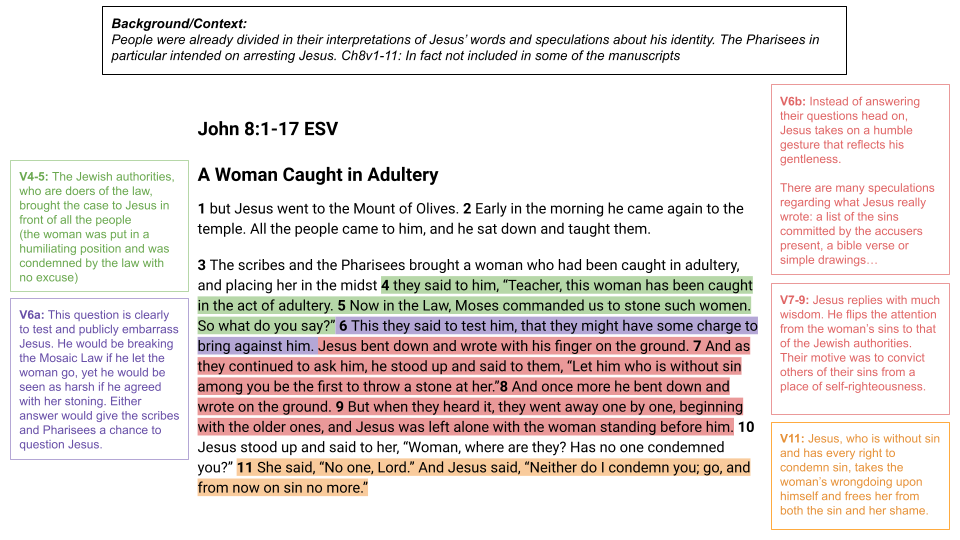
Refer to slide for Observations of the passage and use it to read alongside below Interpretation/Application.
Have you ever been caught lying or doing anything wrong that couldn’t be justified? As a kid I was once so envious of a beautiful new toy that my friend had that I took it and hid it away in my own drawer. Soon she started looking for it, and I scrambled to return it to her with flushed cheeks and a guilty conscience. We all know what it feels like to have that sinking feeling of shame that urges us to run and hide.
This was the exact position of the woman caught in adultery, whose wrongdoing was on full display before the Jewish authorities and Jesus. She must have been crippled by embarrassment and the fear of her imminent penalty.
Or maybe we are familiar with seeing this happen to others, and it’s all too easy to feel justified in any anger, bitterness and impatience toward the wrongdoer from a place of self-righteousness. Maybe upon seeing their guilt we even pound on it a little more, in hope that they’d be more convicted and decide to change?
This was the case with the Jewish authorities, who publicly shamed the woman while hoping to catch Jesus out. Upon being cleverly exposed by Jesus of their own sins they left in silence and probably shared in the woman’s sense of guilt and shame.
Jesus’ response to the woman awaiting her stoning was what changed everything: ‘Neither do I condemn you (v.11).” Just like that, what could have been death became life and freedom instead.
In her book ‘Covered Glory’, author Audrey Frank recounts the instance of how this very sentence moved a muslim woman to faith. She was shocked by how Jesus defied the worldly system of honor and shame with an unconditional love that rises above her past and can rewrite her future.
The beauty of this story is that it echoes the shame and guilt that each of us bears and points us back to Jesus. Are we like the Pharisees who were impatient and harsh with the sins of others and slow to unravel our pride to see the sins of our own? Or are we like the woman who felt guilty as charged, condemned and defenceless in her sins? The Gospel is drawing us all before the cross, where a love understands our brokenness and defies right and wrong. More than the fear of punishment or the pride of self-righteousness, it is this love that frees us to ‘go and sin no more’. Jesus came not to abolish the law but to fulfill it (Matthew 5:17), and it is His love that melts away our shame and pride and sets us free from cycles of sin and guilt.

